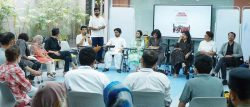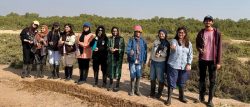Habib University’s faculty member Dr. Hafeez Jamali, Assistant Professor in the Social Development and Policy program from the School of Arts, Humanities and Social Sciences recently held an intriguing seminar at the Arts Council Karachi, as part of their ongoing “Digging Deep, Crossing Far” exhibition. Inspired by the research delving into World War I archives kept in Germany. The exhibition was held between 27th May till 4th June, and focused on the history of colonial soldiers originating from South Asia. It played host to artists from Berlin, Bangalore, Karachi and Lahore, along with several seminars and talks on relative topics, offering perspectives from around the globe on the background of World War I.
Along with Dr. Hafeez Jamali, several artists and scholars from Berlin, Bangalore, Karachi and Lahore were also present and participative in the project. Dr. Jamali’s expertise in the history of Baloch entanglement with colonial military circuits was explored within his session, as he excitedly revealed his findings, research and evidence collected from the German archives. “I was not looking for these recordings, they found me actually, in the summer of 2012 when I was visiting Germany, so I chose to explore the archives”. Belonging to the region of Balochistan himself, Dr. Jamali showed a special interest in the archives due to the fact that, from an anthropological point of view, few pointers exist covering the history of the people especially during that point in time.
I have been revisiting the recordings and taking them to my native village in central Balochistan to the Kachhi Plains where people have helped me trace the sepoys the voices belong to. These archives have, in fact, opened for us a window to Pakistan history and Baloch history.
He pointed out the fact that the Makrani Baloch tribes have been the backbone of the marine front for the last 400 years, from the Sultanate of Oman to the Chabahar Port in Iran, all the way to Zanzibar and Mombasa in African regions. The history and origins of the Baloch was also traced back into colonial circuits in Asaam to the Australian outback, where the purchase of camels was done through the Makrani Baloch.
The Western anthropologists have been promoting a deceptive image of the Baloch all these years, of them being an inflexible race willing to move, but the Baloch people have several dimensions to them and are not a single-track race. These snippets of history are further evidence of the fact that they are not stereotypes as thought of by colonial mindsets.
According to the research shared by Dr Jamali, British efforts to recruit Baloch in the military were not very successful at first but help from John Jacob of Jacobabad and Sir Charles Napier got them several recruitments in Sindh as well as Balochistan and the 1890s saw recruitments from Kallat, Makran and eastern Balochistan. To wrap up Dr. Jamali’s session, a tribute song and poems were recited in Brahvi and Balochi by Shahdad Kham, songs sung to this day by Balochi tribes in the Kachhi Plains.
Read more about Dr. Jamali’s session here




